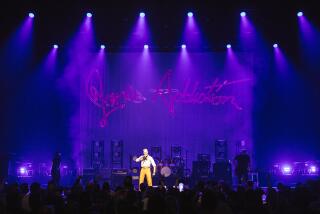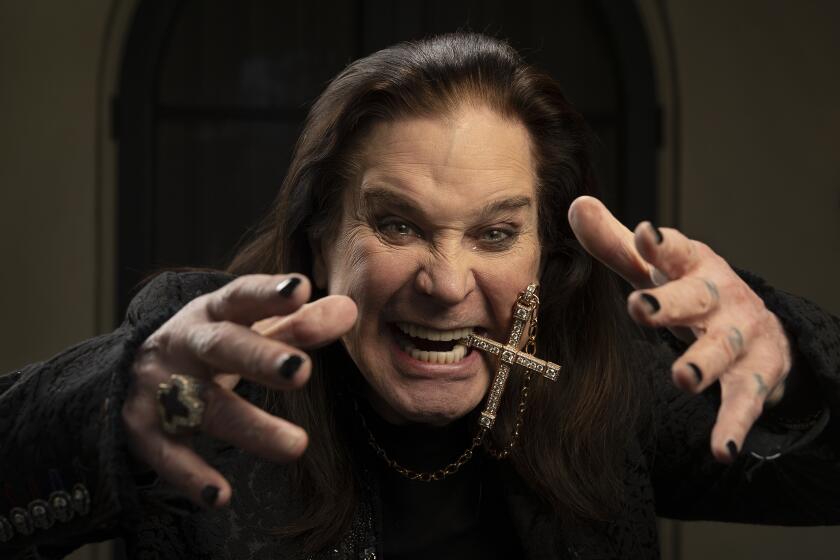It’s Perry’s ‘Palooza Again
- Share via
Perry Farrell is back, the likes of Metallica are gone and Lollapalooza apparently is ready to resume the spirited eclecticism of its first few years.
Co-founder Farrell, one of the most influential figures in alternative rock, withdrew from active participation in the annual summer tour last year, citing the ’96 lineup’s emphasis on hard rock.
His return to active duty on the Lollapalooza board of directors--which a spokesman confirmed Tuesday--is a signal to many that the tour organizers are committed to renewing its heritage as a showcase for developing pop music currents.
And they may try to do it without a mega-star headliner, returning to the original approach of making Lollapalooza itself, rather than any one band, the star attraction.
That slant is reflected in the list of acts reportedly being courted for this summer. It includes Korn and Tool, two of the hottest bands in a new generation of hard-hitting, guitar-based American rockers, as well as Prodigy, the English techno band recently signed by Maverick Records after a high-profile bidding war.
Organizers, including Farrell, declined to comment on this summer’s plans, saying it’s too early in the process. But observers say that securing those acts as part of a cutting-edge smorgasbord would be a big step in giving Lollapalooza a leg up on such competing tours as H.O.R.D.E. and the new, all-female Lilith Faire as a platform for all facets of the rapidly changing--and increasingly segmented--music culture.
“Last year, Lollapalooza was the burly boys’ club with Metallica headlining; before that, all indie-rock with Sonic Youth and Hole,” notes Spin magazine executive editor Craig Marks. “It would be great to see if they could pull one off that didn’t have a reigning aesthetic, but a show that reflected the fragmented state of music.”
KROQ music director Lisa Worden agrees. “From my conversations with [Lollapalooza organizers], they always try to make the shows expose different kinds of music, even though the last couple of years have been big rock fests.
“From what I hear,” Worden says, “they’re going to explore different things this year. They know they need to reinvent themselves. It’s time, especially with all the other festival tours that are out there now.”
Signing up Korn and Tool would seem a fairly straightforward matter. Tool, from Los Angeles, is managed by Ted Gardner, Farrell’s former manager and himself a Lollapalooza co-founder and director. Korn, from Orange County, is represented by a new Lollapalooza director, William Morris agent John Marx.
Landing Prodigy may not be as easy. The band’s agent, Gerry Gerard, is starting his own techno-oriented tour this summer, expanding his one-time Organic show of last year into a national trek. Gerard says he would love to have Prodigy anchor his venture but ultimately will let the group decide which tour--if any--would be better for it.
“The Lollapalooza people keep saying they will make a proposal to Prodigy, and when they do, I’ll have to take off my tour organizer hat and put on my agent’s hat and present the two possibilities to the band,” Gerard says.
If Prodigy passes on Lollapalooza, the organizers are expected to set their sights on other leading techno acts, especially the Chemical Brothers and Underworld.
Expected to fill out the lineup are a hip-hop act (Dr. Dre has been mentioned, though his heavy recording schedule might work against him) and a “veteran” act (Depeche Mode reportedly has declined; Morrissey remains a possibility).
Several other coveted acts also reportedly have taken themselves out of the running, including funk-reggae-rock band 311 and Garbage, one of 1996’s hottest new acts. Garbage is planning to record its second album this summer.
There is talk that the organizers still could pursue a big seller to top the bill (Bush is mentioned often), but the focus is more on a strong lineup from top to bottom. The best of both worlds is when one or more of the booked bands rockets to stardom after signing on, as happened in the second year, 1992, when both the top-billed Red Hot Chili Peppers and newcomer Pearl Jam exploded in popularity.
That’s a bit of a risk, but it’s fine with key concert promoters who are looking for a more economical package after last year’s tour. The per-show average gross last year was nearly $800,000, which was second only to 1994 and well ahead of 1995. But production and talent costs for ’96 were higher than ever, especially for the shows held at airstrips or raceways where concert facilities had to be built from scratch.
“When the Smashing Pumpkins headlined [in 1994], the band wasn’t strong enough yet to headline big shows on its own, but Lollapalooza was strong,” recalls Jim Koplik, president of the Metropolitan concert promotions firm, based in New Jersey. “If they go back to the basics and pick hot bands on the rise, they can still do very well.”
Most encouraging to many observers is the return of Farrell, the Porno for Pyros leader who headlined the first Lollapalooza with his earlier band, Jane’s Addiction. When he distanced himself from the tour last year, he indicated that the rift was permanent and that he was seeking a buyout of his share of ownership so he could finance his fledgling ENIT festival.
ENIT, rooted in rave, was praised for its forward-thinking blend of music and communal idealism but was unable to make any significant impact with its limited dates. Lollapalooza could give Farrell a strong base from which to continue his experiments.
Farrell clearly had been frustrated with Lollapalooza for a while before his exit last year, talking openly in interviews about his clashes with his co-founders and about the direction of the tour, which he felt had lost touch with his own ideals of surprising, challenging and even risky experiences.
But his return to the board isn’t the only change in its makeup: Of the four members, two--Marx and William Morris senior vice president Peter Grosslight--are brand-new. Marx and Grosslight have replaced co-founders Don Muller and Marc Geiger, who recently left executive jobs with Morris and American Recordings, respectively, to start their own Artists Direct agency and record label.
Muller and Geiger said through a representative that their relationship with Lollapalooza’s organizers remains good and that their own departures were amicable, but many see the change in the tour’s management as key to its new path.
“This year maybe they can find the link between what Perry was trying to do with ENIT and what Lollapalooza was originally,” says Jason Fine, editor of the alternative-music magazine Option in Los Angeles. “They should mix rock bands and more electronic stuff and see if the audiences merge. Maybe they could. . . . It’s the only way to get some credibility back.”
More to Read
The biggest entertainment stories
Get our big stories about Hollywood, film, television, music, arts, culture and more right in your inbox as soon as they publish.
You may occasionally receive promotional content from the Los Angeles Times.










